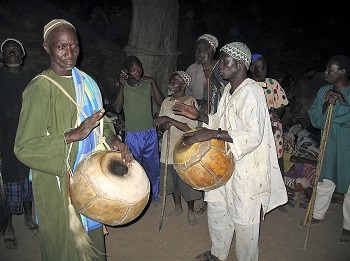DigiDogon: Digitizing Dogon heritage. The legacy of Abirè, the Dogon prophet
 This project aims at recording and safeguarding parts of the intangible cultural heritage of the Dogon in central Mali. A major song cycle, the baja ni, forms an integral part of Dogon funeral traditions. The song cycle is attributed to Abirè, a blind Dogon poet/prophet, probably from the 19th c., who also delivered several prophecies on the area. ASCL researcher Wouter van Beek, who has been studying baja ni performances since 1980, collected many hours of recordings. Recently, he has prepared a publication which, together with these recordings, serves as the starting point for this project. Due to Islamisation and Christianisation, traditional funerals are becoming rare; hence the transmission of the baja ni is in peril. Additionally, current jihadist troubles present an immediate and even violent threat to this heritage.
This project aims at recording and safeguarding parts of the intangible cultural heritage of the Dogon in central Mali. A major song cycle, the baja ni, forms an integral part of Dogon funeral traditions. The song cycle is attributed to Abirè, a blind Dogon poet/prophet, probably from the 19th c., who also delivered several prophecies on the area. ASCL researcher Wouter van Beek, who has been studying baja ni performances since 1980, collected many hours of recordings. Recently, he has prepared a publication which, together with these recordings, serves as the starting point for this project. Due to Islamisation and Christianisation, traditional funerals are becoming rare; hence the transmission of the baja ni is in peril. Additionally, current jihadist troubles present an immediate and even violent threat to this heritage.
The aim of the project is, first, to widen the empirical knowledge on the song cycle, to analyse further, and contextualise the performances. Second, the digitalised recordings will be made accessible to the Dogon themselves, set in a digital framework which contextualises the songs inside their material setting. A third goal is to initiate processes and institutions that may keep the heritage alive, independent of traditional funerals.
Senior researchers
External affiliates
Geographic
Keywords
Funding and cooperation
JPI on Cultural Heritage
International project between African Studies Centre Leiden (ASCL) and University College London (UCL).
Other partners: Musée National du Mali in Bamako, Ginna Dogon, UNESCO office in Mali.

